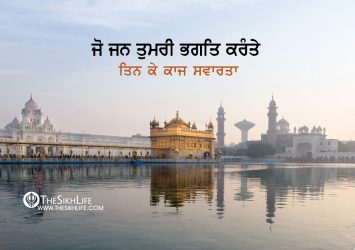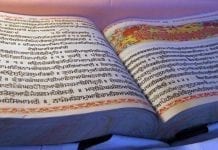Theme for the Week:
We come across many historical and mythical names while reading or listening to Gurbani.
This week once again we feature five such references from Hindu mythology through a world of stories in Hindu Literature.
These stories will introduce us to some legendary sages referenced in Gurbani from ancient Hindu texts.
You can trace some of them in the verse below:
ਨਾਰਦ ਮੁਨਿ ਜਨ ਸੁਕ ਬਿਆਸ ਜਸੁ ਗਾਵਤ ਗੋਬਿੰਦ॥
Narad, many sages, Sukdev, Vyas, etc., sing the praise of the Divine. -Guru Arjan Sahib, Guru Granth Sahib, 298
ਨਾਰਦ (naarad)
Meaning: noun: Narad or Narada, a legendary sage.
Quote:
ਨਾਰਦ ਕਹਤ ਸੁਨਤ ਧ੍ਰੂਅ ਬਾਰਿਕ ਭਜਨ ਮਾਹਿ ਲਪਟਾਨੋ॥
naarad kahat sunat dhroo baarik bhajan maahi lapṭaano.
Listening to the advice of Narad, Dhru the young child engaged in the praises of the Divine
– Guru Teg Bahadar Sahib, Guru Granth Sahib, 830
Message: Listen to the Guru within and without
There’s a saying, “When the student is ready, the teacher will appear.”
In this legend, Dhru learned how to realise the Divine by meeting Narad his teacher.
As described in the Hindu epic Mahabharata, and the mythologies of the Puranas, the ancient Hindu texts, Narad was a great sage.
Dhru had resolved to leave home and go into the forest in search for truth. On his way, he met Narad who guided and mentored him by imparting spiritual wisdom to him.
Legend has it that through his guidance, he attained spiritual enlightenment.
We also can achieve a state of inner illumination, peace, and poise, if we inculcate and follow the instructions of the Guru and learn to recognise the presence of the Divine.
To read about Dhru, please click here.
Note: Narad appears in many mythical legends of Hinduism, in various characters: one who acted as messenger and reporter to the gods, and also one who started quarrels among them and people by tale-bearing, etc. He is described as both wise and mischievous.
Etymology: From Sanskrit, naarad, a famous Vedic sage who appears in Hindu epics, the Mahabharata, the Ramayana, and the mythologies of the Puranas, the ancient Hindu texts. Read more here.





